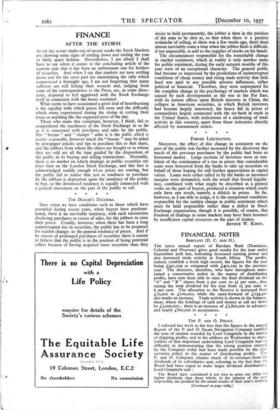FINANCE
AFTER THE STORM AFTER the severe shake-out of recent weeks the Stock Markets are showing some signs of settling down and ending the year in fairly quiet fashion. Nevertheless, I am afraid 1 shall have to say when it comes to the concluding article of the current year that it has been an unfortunate one for holders of securities. And when I say that Markets are now settling down and for the most part are maintaining the rally which commenced a fortnight ago I am not forgetting that many sufferers are still licking their wounds and, 'judging from some of the correspondence ia the Press, are, in some direc- tions, disposed to feel aggrieved with the Stock Exchange itself in connexion with the losses sustained.
What seems to have occasioned a good deal of heartburning is the rapidity with which prices fell away and the difficulty which many experienced during the slump in cutting their losses at anything like the supposed price of the day. Those who make this complaint, however, I think, fail to comprehend the machinery of the Stock Exchange in so far as it is concerned with purchases and sales by the public. For " booms " and " slumps " alike it is the public which is mainly responsible, however much the " booms " may be aided by newspaper articles and tips to purchase this or that share, and the jobbers from whom the shares are bought or to whom they are sold are all the time guided by the disposition of the public in its buying and selling transactions. Normally, there is no market on which dealings in public securities are freer than on the London Stock Exchange, and this fact is acknowledged readily enough when prices are soaring, but the public fail to realise that just as readiness to purchase by the jobbers is dependent upon the tendency of the public to buy, so the downward tendency is equally connected with a general movement on the part of the public to sell.






















































 Previous page
Previous page